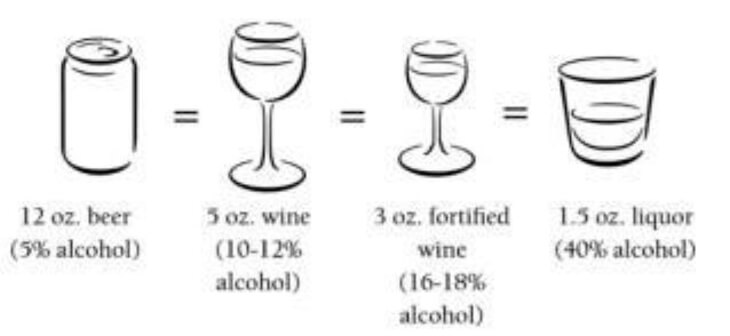What happens when you binge drink?
Intoxication affects your judgment, your attitude, your behaviour and your reflexes. People do all kinds of things when they are drunk that they would never dream of doing when they are sober. People are less inhibited, sensitive and aware and more reckless and careless when they are intoxicated. They often do things that seem stupid, dangerous, embarrassing or even shameful to them once they have sobered up.
Risks of binge drinking
When you binge drink, your risk of many safety and health problems increases. These include:
- misjudging a situation or what is being said
- getting into a fight or being assaulted
- having unwanted sex or pushing unwanted sex on others
- developing or worsening depression, anxiety and other mental health problems
- having blackouts (when you lose all memory of where you were and what you did when you were drunk)
- getting a hangover (headache, shaking, vomiting)
- seeing suicide as a way out when you are feeling down
- getting injured or killed while driving, biking, boating, snowmobiling, walking or being a passenger
- getting injured or killed from a fall, drowning or fire
- getting sick and possibly dying from alcohol poisoning
- choking on your own vomit (which can kill you if you are passed out)
- going into respiratory arrest (meaning you stop breathing).
Over a longer term, repeated binge drinking can also increase the risk of:
- damage to your stomach, pancreas, liver and brain
- developing cancer
- developing an addiction to alcohol.
- Binge drinking also increases your risk of arrest and other legal problems.
What are the signs of alcohol poisoning?
Alcohol poisoning, caused by too much alcohol, is extremely dangerous and can cause coma and death.
Signs include:
- disorientation or confusion
- passing out, not being able to be woken up
- slow, irregular breathing
- bluish or pale, cold, clammy skin
- slowed heart rate
- vomiting while passed out.
What do I do?
When someone is passed out from alcohol poisoning:
- gently roll the person on his or her side, tilting the head back and tucking the top hand under the chin to keep the mouth open and the airway clear. This helps to reduce the risk of choking if the person vomits. Bend the person’s top leg and bottom arm to support this position
- do not leave the person alone
- call 911 if you cannot wake the person, especially if he or she is vomiting or has vomited.
How can I be safer when I drink?
When you know you will be drinking, plan ahead, stay in control and stay safe!
Try these tips:
- Pace yourself by alternating alcoholic drinks with soft drinks or water. Eat before you drink and while you are drinking.
- Know your limit. Keep below it. Don’t let others push you beyond it.
- Drink slowly. Don’t chug. No one will be impressed by how fast you can drink when you’re clinging to the toilet.
- Stop drinking before you feel drunk.
- Don’t mix alcohol with medicines, illegal drugs or energy drinks. Other drugs may interact with alcohol, causing effects you don’t expect or are unable to control.
- Count your drinks. Ways to keep track include keeping your bottle caps in your pocket.
- Think about your reputation, your safety and the safety of others.
- Watch your drink so that no one can slip anything into it when you’re not looking.
- Plan ahead. Arrange to walk, take a taxi or public transit home with a sober buddy; get someone you can trust to pick you up; or stay overnight where you will be drinking.
- If you drink any alcohol, do not drive. The only way to know whether the level of alcohol in your body is within the legal limit for driving is a breathalyzer or blood test. You can’t tell by the way you feel. Just as important, don’t ride with a driver who has been drinking.
What can I do if I want to stop drinking, but can’t?
If your drinking is causing problems in your life and you want to stop, but can’t, ask for help. Tell your friends and family members you want to cut down or stop drinking, and ask them for their support. Ask them to help you organize activities that don’t involve drinking. If your drinking continues to cause problems for you, call one of these organizations for help:
